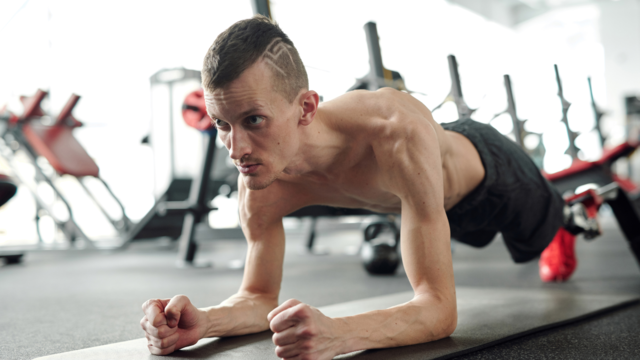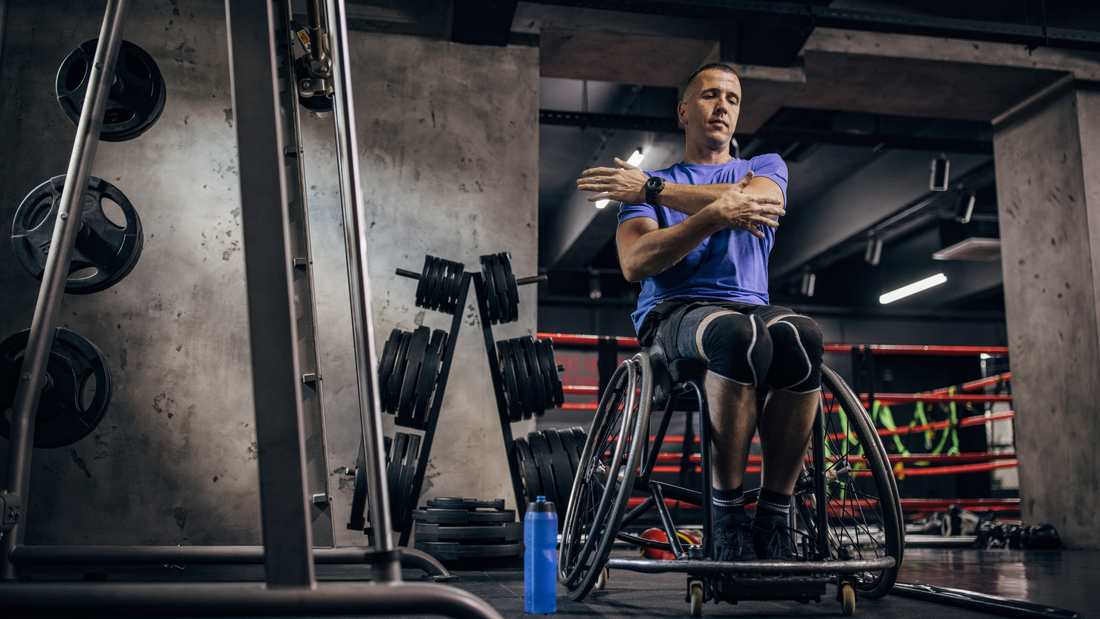|
Everyone says they want to get in shape and become a healthier, fitter person, but only some people stay on track. Getting into a consistent, regular workout routine can dramatically improve your physical and mental health – but if you have a physical disability, you might feel discouraged from starting.
Sticking to a workout routine is vital even if you're differently abled. Let's go over a few reasons why working out is so important and a few tips that will help you stick to your exercise regime. The Importance of Exercise with a Physical Disability Everybody needs exercise, but it's especially important if you have a physical disability. Of course, sticking to a regular exercise routine can improve your overall health and quality of life, but it also does so much more for differently abled people. If you have a physical disability, a consistent exercise routine may benefit you in the following ways:
It's important to note that exercise programs for people with physical disabilities should be tailored to the individual's abilities and needs. Working with a qualified physical therapist or exercise specialist can help ensure that exercise programs are safe, effective, and enjoyable. 5 Tips to Stick to Your Exercise Regime Most people know that exercise is good for the body, mind, and spirit, but keeping up with a new exercise routine can be a struggle, no matter how motivated you are. These simple tips will help you manage your physical disability and stay on track with your exercise regime. Just make sure you consult a healthcare professional before you get started. Let's go! 1. Begin with SMART Goals Sometimes, people with a physical disability find it more challenging than others to stick to their new exercise regime. Studies show that people with physical disabilities get less exercise than other people. While there may be many reasons for this, differently-abled people can often overcome their challenges by setting S.M.A.R.T. goals:
2. Write Down Your Exercise Plan Writing down an exercise plan and fitness goals means you're much more likely to achieve them. People that write down their goals are often more motivated to work towards them, and seeing clear benchmarks in written form will keep you on the right track. Additionally, writing down your goals will make it easier to develop a system you can stick with, even when you have a physical disability. 3. Get a Workout Buddy Working out with a gym buddy is a great way to stay motivated and stick to your exercise regime! Support from a gym buddy makes it fun to try new workouts and engage in friendly competition. Since people with physical disabilities often struggle with feelings of isolation, exercising with a partner can also quell any feelings of loneliness. It's best to have a gym buddy with the same physical fitness level as you, but this can be challenging when you have a physical disability. Your best bet is to work out in group exercise classes hosted by adaptive fitness specialists. This way, you can make new friends just like yourself and get in shape along the way! 4. Eat the Right Foods Every time you exercise, your body needs the right fuel to recover. A healthy diet will help you gain muscle quickly and have more energy throughout your daily life. Even if you have a physical disability, a healthy diet will be about the same as it would be for everyone else. When it comes to your diet, keep it simple. Make sure to eat lots of healthy carbs, fats, vegetables, and protein to fuel your body. And always discuss your meal plan with a licensed healthcare provider before making any major changes to your diet. 5. Work Out with an Adaptive Fitness Specialist An adaptive fitness specialist specializes in personal training for people with disabilities. As the name suggests, they adapt workouts to each person's needs. An adaptive fitness workout plan may include stretching, Pilates, strength training, and other fun activities. It's challenging for everyone to start a new workout plan. Still, an adaptive fitness specialist can spark your motivation and guide you through the unique obstacles of working out with a physical disability. With their guidance, you'll be able to stick to your new exercise regime and become your healthiest, happiest self! Live a Healthy Lifestyle with Let's Go Fitness If you’re looking for a special needs fitness program, and you’re not sure where to start, our team at Let’s Go Fitness is here to help! We provide special needs fitness programs for differently-abled individuals. At Let's Go Fitness, we strive to create a welcoming environment where anyone can make friends, get in shape, and have fun doing it! Our adaptive fitness specialists guide participants every step of the way. Whether our athletes need accommodations, modifications, or simply an understanding listener, we'll help everyone reach their goals. Are you ready to start a fitness journey for yourself or a loved one? Contact Let's Go Fitness today to learn more about our membership packages!
0 Comments
Everyone benefits from consistent physical activity, and this is especially true for differently-abled individuals. Burning off excess energy, enhancing motor skills, and improving physical fitness are excellent reasons to start a new exercise regime, but people that are differently-abled may struggle to find special needs fitness programs that can accommodate their abilities.
Plenty of independent studies support the assertion that movement-based therapy positively impacts the physical body, along with communication skills, behavioral problems, and even academic performance for children with special needs. Moreover, parents will reap the benefits when they can connect with other families that relate to their life experiences. And the best part is adaptive fitness specialists can guide your child throughout their fitness journey while making all the necessary accommodations. Today, we’ll discuss what it means to have special needs and why special needs fitness programs should be integral to all communities. Let’s get started! Understanding Special Needs The term “special needs” has many different meanings – it can refer to a condition that causes issues in a single aspect of a person’s life or a condition that completely transforms their way of life. However, “special needs” is often used to describe a person’s physical or emotional difficulties that require additional assistance. There are four primary categories of special needs:
Some people are born with special needs, but others develop special needs later in life. It’s important to understand that people with special needs are just like able-bodied individuals, even if they have different needs. What are Special Needs Fitness Programs? Everyone has qualities that make them unique, and people with developmental disabilities need to stay active just like their able-bodied counterparts. Special needs fitness programs are designed for people with special needs. Even though people with special needs are just like everyone else, they may find it difficult to engage in school-sponsored sports activities. As a solution, special needs fitness programs provide a fun, healthy environment where differently-abled people can make friends, build confidence, and get in shape! The Benefits of Special Needs Fitness Programs Of course, you’ll need approval from a primary care physician before starting a new exercise regime. Once your doctor gives you the green light, you’re ready to get in shape with the assistance of adaptive fitness specialists. They Help Children Get Their Daily Physical Activity The CDC recommends that children have an hour of physical activity every day to maintain their physical and mental health. And of course, these guidelines apply to differently-abled children as well, but most differently-abled children don’t get the physical activity they need. Special needs fitness programs provide a safe space for differently-abled children to improve their self-esteem, maintain a healthy weight, and reduce the stress of daily life. While most children can get their hour of physical activity throughout the day, children with disabilities may need a little extra help reaching this goal, but special needs fitness programs bridge the gap. Exercise Has Additional Benefits for Children with Disabilities Exercise is beneficial for everyone, but children with disabilities and other chronic conditions experience more benefits than other children. Exercise for children with disabilities enhances their physical function and reduces deconditioning, which instills them with greater independence. Special needs fitness programs offer a level of inclusion that differently-abled children may not experience in other areas of their lives. In many cases, children with disabilities don’t partake in group fitness activities at school, so special needs fitness programs are an excellent way for differently abled children to experience the inclusion in group activities essential for emotional development. Adaptive Fitness Professionals Can Provide Personalized Training Studies show that about 40% of children and teens in the United States are differently abled or have a chronic health condition. However, physical activities are seldom tailored to meet the needs of differently-abled individuals. Since differently-abled people often don’t have access to the right fitness programs, it can be difficult for them to maintain their physical and mental health. Special needs fitness programs allow differently-abled people to participate in specialized training with the help of adaptive fitness professionals. These trainers understand the unique needs of differently-abled individuals and teach them how fun it can be to get in shape with friends! Parents and Children Find Support and a Community Differently-abled children are more likely to experience isolation and feel misunderstood. However, special needs fitness programs bring differently-abled children together with peers with similar issues. Furthermore, adaptive fitness specialists know how to manage meltdowns in a way that makes the child feel understood. The parents of children with special needs face unique challenges that other parents may not understand. When these parents have support from a like-minded community, they can have the emotional support necessary for special needs fitness programs and also help families learn more about how to care for their differently-abled child. Get in Shape with Let’s Go Fitness If you’re looking for a special needs fitness program, and you’re not sure where to start, our team at Let’s Go Fitness is here to help! We provide special needs fitness programs for differently-abled individuals. At Let's Go Fitness, we strive to create a welcoming environment where anyone can make friends, get in shape, and have fun doing it! Our adaptive fitness specialists guide participants every step of the way. Whether our athletes need accommodations, modifications, or simply an understanding listener, we'll help everyone reach their goals. Are you ready to start a fitness journey for yourself or a loved one? Contact Let's Go Fitness today to learn more about our membership packages! Getting in shape and maintaining physical fitness are integral parts of a healthy lifestyle for everyone, even people with developmental disabilities. However, differently-abled individuals often feel that getting started on a new exercise routine is challenging, especially when most exercise regimes aren’t made for people with diverse abilities.
Regular exercise can enhance cognitive abilities, reduce the risk of disease, and improve your ability to move independently. If you or a loved one has a developmental disability and feels ready to get fit, we’ll show you how to get started! What Are Developmental Disabilities? “Developmental disability” is a broad term used to describe conditions that impact a person’s physical and mental functioning. When a person’s physical or mental limitations become apparent in childhood, they are considered developmental disabilities. In some cases, developmental disabilities may not be recognizable until age three. Once these symptoms appear, they will be present for the rest of a person’s life. A few examples of developmental disabilities include autism spectrum disorder, cerebral palsy, and Down syndrome. The Characteristics of Developmental Disabilities Every child develops at their own pace, but children with developmental disabilities may take much longer to meet developmental milestones relating to speech, motor, and social skills. They may also exhibit behavioral symptoms, such as emotional outbursts or a lack of response to external stimuli. Signs of developmental disabilities may include:
If a loved one is exhibiting signs of developmental disabilities, seek a proper diagnosis from a licensed healthcare professional. What Causes Developmental Disabilities? Some developmental disabilities are purely genetic, so symptoms can arise even when the parents are healthy. However, all of these developmental disabilities are related to the nervous system and brain development. A few known causes of developmental disabilities include:
The direct cause of developmental disabilities is not always known, but these disabilities are almost always related to the brain developing abnormally. The good news is that with proper care, people with developmental disabilities can manage their symptoms and live healthy, happy lives. Why Should Someone with Developmental Disabilities Exercise? According to the Centers for Disease Control and Prevention (CDC), individuals with developmental disabilities are more likely to have obesity, heart disease, stroke, diabetes, or develop cancer compared to those without disabilities. Regular physical activity can help people with developmental disabilities manage their conditions and reduce the risk of developing more health problems. Additionally, exercising can be a great way for people with developmental disabilities to form social connections with new people. 5 Exercises for Individuals with Developmental Disabilities These fun exercises will help differently-abled people improve their fitness and have fun along the way. Keep in mind that it’s essential for those with developmental disabilities to consult a licensed healthcare provider before beginning a new exercise regime. But once you have the green light, these exercises can help you or your loved ones get in the best shape of your life! 1. Adaptive Sports Adaptive sports are an excellent way for people with developmental disabilities to get active. Adaptive sports are just like regular sports, except they include a few modifications so that people with developmental disabilities can also participate. Some of the best adaptive sports include:
These activities help differently-abled individuals improve their cardiovascular health and physical strength while getting in shape with people who are just like them. 2. Adaptive Yoga In most yoga classes, people seem to bend themselves in a series of pretzel-like poses, but this exercise is actually about so much more than that. Yoga is a full-body practice that uses physical activity and meditative breathing to promote relaxation. And with adaptive yoga, even people with developmental disabilities can reap its benefits. Adaptive yoga uses blankets, straps, and chairs to make yoga more accessible to people with developmental disabilities. This allows differently-abled people to develop flexibility and improve motor skills. 3. Dance Anybody can dance, including people with developmental disabilities. Dance is a powerful form of self-expression with profound mental, physical, and emotional benefits. Since emotions are stored in the body, dance therapy is a wonderful way for people with developmental disabilities to express their emotions. Not only does dance improve physical fitness, but it also creates a sense of autonomy that people with developmental disabilities may not experience in other aspects of their lives. Meanwhile, differently-abled people can also experience the benefits of improved sensorimotor integration through dance. 4. Aquatic Therapy Aquatic therapy is one especially beneficial form of exercise for people with developmental disabilities. This is because the water mitigates the effects of gravity on the body, thereby reducing strain on the joints and muscles. A few of the best aquatic therapy exercises include:
Aquatic therapy increases joint flexibility, muscle strength, and balance while reducing physical pain that might otherwise discourage some differently-abled athletes. 5. Group Fitness Nobody wants to feel limited by their physical or mental abilities, but sometimes, people with developmental disabilities feel left out of social interactions with others. However, group fitness classes made especially for people with developmental disabilities are a great way to get in shape and socialize with like-minded people. Group fitness classes create a safe space where people with developmental disabilities can get in shape with friends! And the best part is, with online workout classes at Let’s Go fitness, you can get started on an adaptive group fitness regime in the comfort of your own home. Get in Shape with Let’s Go Fitness At Let's Go Fitness, we strive to create a welcoming environment where anyone can make friends, get in shape, and have fun doing it! Our adaptive fitness specialists guide participants every step of the way. Whether our athletes need accommodations, modifications, or simply an understanding listener, we'll help everyone reach their goals. Are you ready to start a fitness journey for yourself or a loved one? Contact Let's Go Fitness today to learn more about our membership packages! |
ABOUTLet's Go Fitness's blog page keeps you up to date with educational and instructional information for training with diverse abilities. Archives
June 2023
Categories |
Let's Go Fitness
© 2020 Let's Go Fitness is an online fitness platform for people of all abilities.



 RSS Feed
RSS Feed